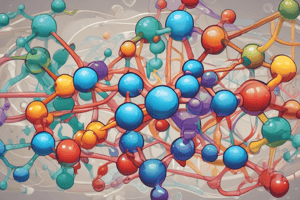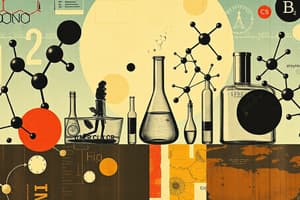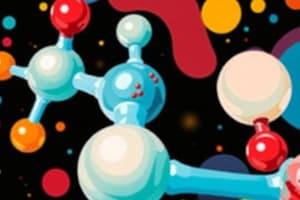Podcast
Questions and Answers
What characterizes organic molecules?
What characterizes organic molecules?
- They consist only of carbon.
- They contain nitrogen and oxygen.
- They are chemical compounds containing both carbon and hydrogen. (correct)
- They are found exclusively in living organisms.
What does the structure of methane allow for in terms of organic chemistry?
What does the structure of methane allow for in terms of organic chemistry?
- It prevents the formation of chains or branches.
- It limits the formation of larger molecules.
- It facilitates assembly into more complex structures. (correct)
- It makes it impossible to bond with other elements.
Why is carbon essential in the formation of organic molecules?
Why is carbon essential in the formation of organic molecules?
- It allows for the creation of simple linear structures.
- It is the only element that can bond with oxygen.
- It can form a maximum of 2 covalent bonds.
- It has 4 electrons which facilitate the formation of 4 covalent bonds. (correct)
What is a key property of methane as an organic molecule?
What is a key property of methane as an organic molecule?
Which of the following elements is NOT listed as one of the important elements found in organisms?
Which of the following elements is NOT listed as one of the important elements found in organisms?
Which statement about organic molecules is incorrect?
Which statement about organic molecules is incorrect?
What is the primary function of carbohydrates in organisms?
What is the primary function of carbohydrates in organisms?
Which monomer is associated with proteins?
Which monomer is associated with proteins?
What distinguishes purines from pyrimidines in nucleic acids?
What distinguishes purines from pyrimidines in nucleic acids?
Which of the following organic molecules does NOT consist of repeating subunits?
Which of the following organic molecules does NOT consist of repeating subunits?
What is the key feature of nucleotides in nucleic acids?
What is the key feature of nucleotides in nucleic acids?
Which component is NOT typically found in an amino acid?
Which component is NOT typically found in an amino acid?
What type of molecules consists of monomers linked together in long chains?
What type of molecules consists of monomers linked together in long chains?
Flashcards are hidden until you start studying
Study Notes
Organic Molecules
- Organic molecules are chemical compounds that contain both carbon and hydrogen.
- Methane (CH₄) is a simple example of an organic molecule, demonstrating single covalent bonds.
Importance of Carbon
- Carbon atoms have 4 electrons in their outer shell, allowing the formation of 4 covalent bonds.
- This ability facilitates the creation of complex molecules, including chains and branched structures.
Essential Elements in Biology
- Besides carbon, other important elements in biomolecules include oxygen, nitrogen, phosphorus, and hydrogen.
Types of Organic Molecules in Organisms
- All living organisms consist mainly of four types of organic molecules:
- Carbohydrates
- Proteins
- Nucleic acids
- Lipids
Monomers and Polymers
- Monomers are the small, single molecular subunits that combine to form polymers.
- Polymers are formed by repeating patterns or chains of multiple monomers.
Carbohydrates
- Composed of simple sugars and primarily contain carbon, hydrogen, and oxygen.
- Some carbohydrates may have a benzene ring structure.
- Their primary function is to store energy.
Proteins
- Proteins are made up of amino acids, which include:
- Amino group
- Alpha (𝛼) carbon
- Hydrogen atom
- Carboxyl group
- Variable side chain, contributing to diverse protein functions.
Nucleic Acids
- Nucleic acids consist of nucleotides, including:
- A 5-carbon pentose sugar (deoxyribose in DNA, ribose in RNA)
- A phosphate group
- A nitrogenous base (adenine [A], thymine [T], uracil [U], guanine [G], cytosine [C])
- Base pairing rules include:
- A pairs with T (or U in RNA)
- G pairs with C
- Adenine and guanine are classified as purines, while thymine (or uracil) and cytosine are pyrimidines.
Lipids
- Lipids do not have a specific monomer unit.
- They are diverse and complex molecules, lacking a defined "building block."
Studying That Suits You
Use AI to generate personalized quizzes and flashcards to suit your learning preferences.




